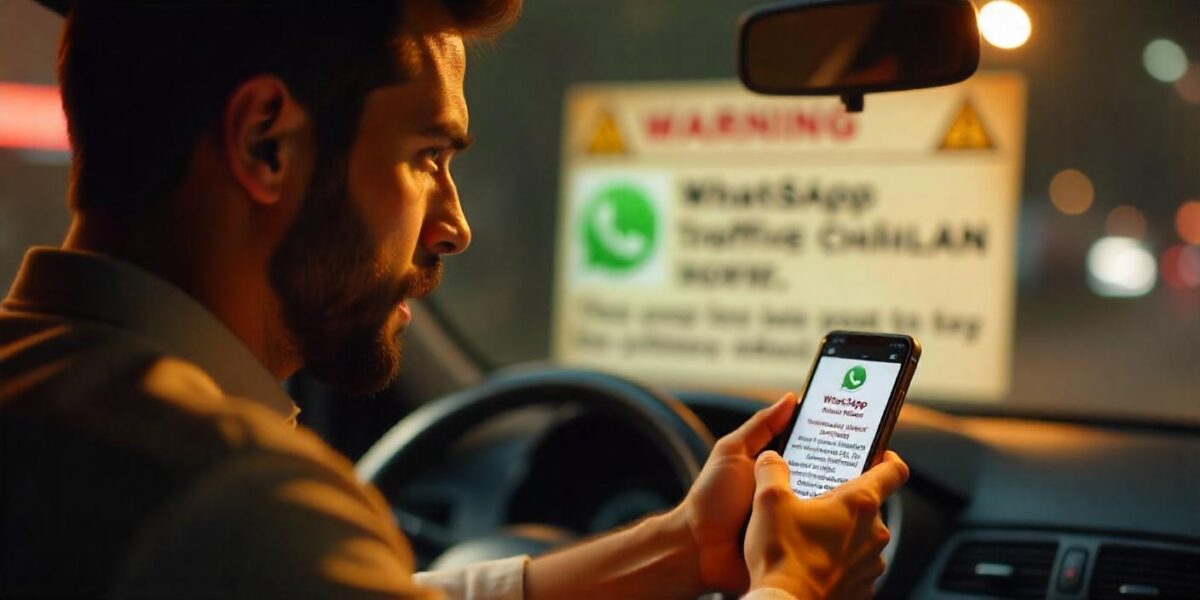Have you ever received a WhatsApp message claiming you missed paying a traffic challan? Or perhaps a suspicious-looking link asking you to verify your vehicle details through the Vahan Parivahan portal? At first glance, it may seem like a routine message from the transport department. But what if clicking it could wipe out your bank account?
Such Vahaan Parivahan WhatsApp scams are quite common these days, resulting in financial losses.
Let’s get into the details to understand how such scams are operated and ways to protect yourself.
What is the Vahan Parivahan WhatsApp Scam?
Vahaan Parivahan is a government website that is meant to provide services for your Driving License, Registration certificate, etc. With AI and other technology, scammers are now able to create fake websites to trick people.
Now, to trap people, they reach out to WhatsApp from an unknown number. They curate the message around fake traffic challans or to complete KYC for vehicle registration, or to apply for a DL.
Along with the message, they generally send a document that is none other than a fake APK file with malware.
The receiver finds the message harmless, clicks on the file, which downloads the malware onto their device, which helps the scammer to read OTPs or hack banking apps installed on the device.
Sometimes, to trap people, they often execute a WhatsApp video call scam where they claim to be a government official and encourage people to connect on a video call.
However, in the video call, they display some adult content and record the screen along with your reaction to blackmail you. By the time you realize the scam, the scammer has control of your emotions and finances.
Bengaluru Man Lost ₹70,000 Over a Fake Challan
Here is one of the cases, where a Bengaluru man was trapped in one such Vahaan Parivahan WhatsApp Scam.
He received a WhatsApp message with a link that looked like an official Vahan Parivahan challan portal.
After downloading the APK file to view his supposed challan, he found ₹70,000 missing from his bank account. By the time he realized it was a scam, the money had already been transferred to multiple accounts.
Such scams have been on the rise across metro cities, often targeting unsuspecting citizens who may not be aware of how government systems like Vahan Parivahan communicate.
How Does Vahan Parivahan WhatsApp Scam Work?
Here’s how the scammer traps people in the WhatsApp scam:
- The victim receives a WhatsApp message posing as a government transport authority.
- The message includes a link to “view challan details” or “verify vehicle status”.
- Clicking the link prompts the user to download an APK file.
- The APK installs malware that gains access to personal and banking apps.
- The fraudsters quickly execute transactions or harvest sensitive data.
This tactic is also a reminder that not every unknown message is safe, even if it looks government-issued.
Why is This Scam So Effective?
The reason this scam works so well is that it combines social engineering (posing as a trusted government agency) with technical exploitation (malware via APK).
It preys on fear and urgency—two psychological triggers that push people to act without thinking. After all, no one wants to ignore a traffic challan and risk higher fines or vehicle seizure.
Moreover, the name Vahan Parivahan is itself official and is tied to the Ministry of Road Transport and Highways, giving the scam a believable front.
In panic, people often don’t stop to verify the source, especially if the message appears legitimate and comes with a time-sensitive warning.
How to Identify a Scammer on WhatsApp?
- WhatsApp messages from unknown numbers asking you to pay challans or verify vehicle details.
- Links that require downloading APK files instead of redirecting to a secure government URL.
- Messages with urgency: “Pay now or face consequences.”
- Requests to share OTPs or install unfamiliar apps.
If you’ve ever thought, Why am I getting a WhatsApp registration code without asking for it, then your number may already be compromised, or someone may be trying to take control of your account.
A common side activity among scammers who execute broader fraud schemes.
How to Protect Yourself from Getting Scammed?
- Always verify challans through the official Parivahan website
- Never install APK files sent via WhatsApp unless verified through an official app store.
- Do not share OTPs, passwords, or personal banking details with anyone.
- If you receive such a message, report it on WhatsApp and lodge a cybercrime complaint
- Enable two-factor authentication (2FA) for both your WhatsApp and banking apps.
Conclusion
The Vahan Parivahan WhatsApp scam is not just a wake-up call, it’s a lesson in digital caution.
As fraudsters become more sophisticated, blending official platforms with malicious tactics, it becomes crucial for individuals to stay informed and vigilant.
The line between what’s real and what’s fake is thinner than ever, especially in a world where trust can be faked with a logo and a well-crafted message.







